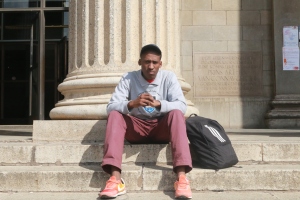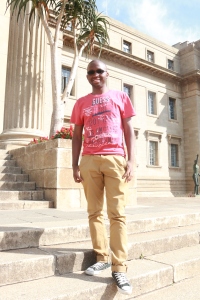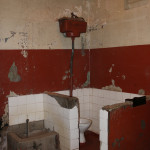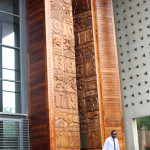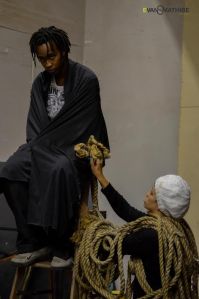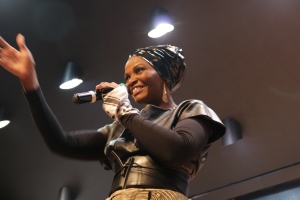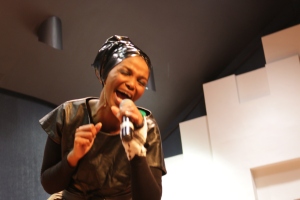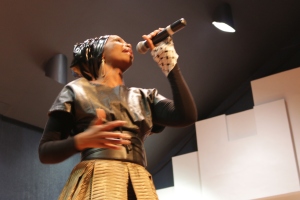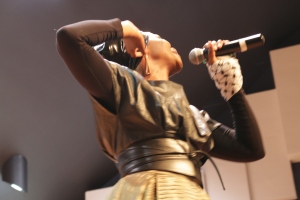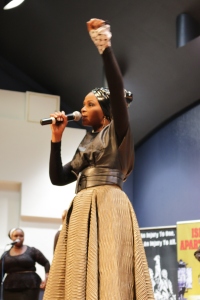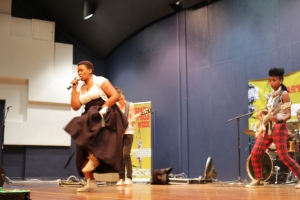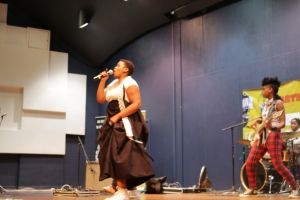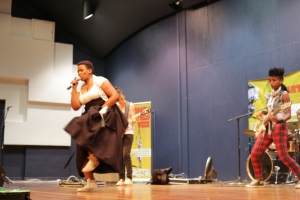Roxanne Joseph and Thabile Manala
Bright and early on Wednesday morning, well before the polls had even opened, many students gave up their holiday slumber to join the long, snaking lines to cast their vote at Wits at the Old Mutual Sports Hall, on Education Campus and in their own neighbourhoods.
Despite the reported apathy among the youth, a large number of first-time voters came out to mark their ‘X’ at Wits.
Others trickled in steadily throughout the day and the lines remained long right up until the polls closed at 9pm.
“I like the numbers and am very impressed with the turnout at Wits,” said Mcebo Sisulu, an honours student in mathematical statistics.
He admitted that he was nervous about the elections and the apparent lack of enthusiasm of the youth.
Born-frees stepped up despite apathy
In the days and months leading up to the elections, the media became fascinated by the born-free generation, those who were born after South Africa became a democracy in 1994.
They were expected to not make a difference to the results, as they only made up 2.5% of the 25 million registered voters, according to the Independent Electoral Commission (IEC). Only about a third of born-frees had even registered to vote.
Earlier in the week, Wits Vuvuzela spoke to a number of born-frees, many of whom were choosing not to vote due to a general sentiment of apathy.
“I’m not inspired enough to vote,” said Zongezile Qeba, 2nd year Chemical Engineering. He said his generation wanted to “forget about the past”.
[su_quote cite=”Prof Daryl Glaser”]”Maybe it’s because the educated, young people are more politicised and more likely to vote.”[/su_quote]
Despite being well aware of the country’s history, many born-frees have little faith in our politicians and political engagement is not a big priority for many.
But the apathetic young were nowhere to be seen on election day, where thousands of first-time voters showed up to stand in long queues at Wits from the early hours of Wednesday to long after the sun had set.
When asked how her first-time voting was, third-year law student Boitumelo Rammala said, “It was amazing. I’m going to do it every time, over and over again.”
“I was excited, because it was my first time and all,” said fourth-year law student Lethokuhle Ntombela.
Prof Daryl Glaser, head of the politics department, said student turnout at Wits was encouraging, despite registration being disappointing amongst the youth as a whole.
“[The turnout of first-time voters] was encouraging. Maybe it’s because the educated, young people are more politicised and more likely to vote,” Glaser said.
SRC president Shafee Verachia set the example when he was caught by Wits Vuvuzela helping his 86-year-old grandmother to the voting station in Malboro Gardens. A first-time voter himself, Verachia said he was voting for the South Africans who participated in the struggle to liberate the nation.
“Personally, it’s about honouring the generation before me, they made the sacrifices for me to have this right to make this vote today,” he said.
The reactions that Wits Vuvuzela got from some of the voters after casting their votes ranged between nervousness and disbelief.
First-year Bracken Hall was unsure he made the right choice with his vote. “I am not a 100% [sure] but, like, any change is a good change,” Hall said.
“It’s great it’s just that I don’t know if I made the right choice… I can’t believe I did that. I actually did not vote for the ANC”, said Wits alumnus Thulani Dyasi.
Muzi Mbatha said: “ I voted for the EFF … I also think I exercised my right to vote.”
Voting out of obligation
Many of the youth were torn between voting out of obligation to the ANC, with their history in mind, and voting for another party. “It’s not difficult for people to be very conflicted by this. People have a strong connection to the ANC,” said Prof Devan Pillay. “Many are conflicted because of their performance and especially because of the current president, [Jacob] Zuma. We don’t have a credible opposition,” he said.
“It’s the classic abused-wife syndrome. It fits in perfectly with people’s attitudes of the ANC. People always go back and are always hoping for change.”
According to Pillay, university students are, as potential members of the middle class, easily sold on all the gains brought by the ANC, such as being able to go to Wits. “Getting them to think differently is a bit of a crisis.”
Glaser said the turnout at Wits is an indication of a more positive future in political engagement for the youth.
“Each generation brings a certain set of strengths to politics. The young bring energy and idealism,” said Glaser.
“They have the longest horizon in the future to look forward to. They should start thinking about how they want to shape it.”

